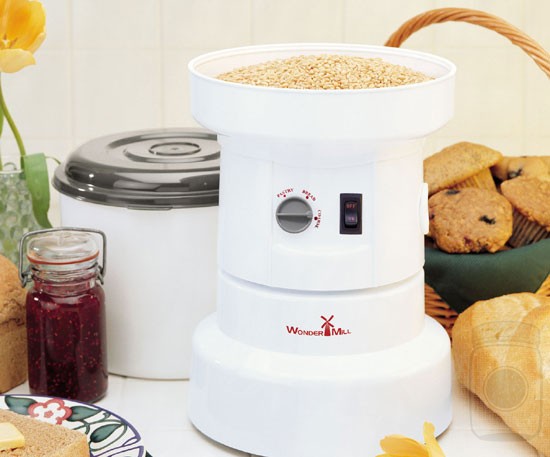Table of Contents[Hide][Show]
 Many readers have emailed me over recent weeks with questions regarding the grain grinding routine in my kitchen. I realized that I needed to take a step back and show you the basics of selecting a grain grinder and other tasks related to making fresh flour to help you determine a routine that works best for you.
Many readers have emailed me over recent weeks with questions regarding the grain grinding routine in my kitchen. I realized that I needed to take a step back and show you the basics of selecting a grain grinder and other tasks related to making fresh flour to help you determine a routine that works best for you.
Remember that starting to grind fresh grain in your home should only be started after you have started cooking with the right fats! Getting the fats right is the most important change you can make in your kitchen.
Using fresh flour is a wonderful addition to your cooking repertoire as even the organic flours from the healthfood store or the ones shipped to your door are nutritionless and not worth the money. Once you grind flour, the nutrition is gone in about 3 days in an unrefrigerated situation. Freezing your flour right after grinding will preserve this nutrition for weeks, which is why you really need to do it yourself. As you can see from the video, flour can be used immediately right out of the freezer, so there is no disadvantage to freezing it.
Grain Requires Proper Preparation after Grinding
Delving into Traditional Eating for the first time inevitably uncovers the fact that modern methods for preparing grains and legumes can be extremely damaging to health over the long term particularly if numerous servings of these foods are consumed on a daily basis as recommended by conventional dieticians and nutritionists.
Even if you take the time and care to make your own bread at home with freshly ground grain, if you do not follow the centuries old traditions for eliminating anti-nutrients and maximizing the nutrition in the grain prior to baking, you could in fact be doing yourself and your family more harm than good. These methods are sour leavening, soaking, and/or sprouting.
But first, you must grind the grain! Below is the video how-to.
Grain Grinding Basics
Sarah, The Healthy Home Economist








I believe that stone ground is better Sarah
Hi, Sarah! Do you clean the grain attachment after each use? Is it sufficient to knock out the loose flour, or must it be taken apart and thoroughly cleaned to prevent rusting as I’ve read in reviews? Thank you for your guidance. 🙂
I just knock out the loose flour. My attachment is not supposed to get wet.
Hi Sarah,
I just watched this video and was excited about the Berlin Bakery bread. However, it doesn’t appear they soak the grain first and I am wondering what your thoughts are on soaking vs. not soaking.
Thanks and keep up the great work!
Janet
Hi Sarah
Please tell me …I use organic grain…barley , buckwheat , millet , etc.
Should I be washing this organic grain, letting it air dry …then grinding..or do you trust that you do not have to wash these grains. and just use .
thanks
Hi Sarah,
Your link about the nutrition in the wheat that’s been ground, no longer works. I am really needing to see that. Do you have another way of getting that information? I took a bread making class and the teacher said she talked to a food chemist that said the flour would not lose any nutrients for 6 weeks. I am really interested to see more info since I’ve been freezing my flour since I saw your video a year ago. Thanks,